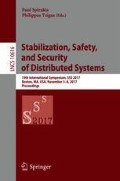Abstract
Secure multi-party computation (MPC) is a cryptographic primitive that enables several parties to compute jointly over their collective private data sets. MPC’s objective is to federate trust over several computing entities such that a large threshold (e.g., a majority) must collude before sensitive or private input data can be breached. Over the past decade, several general and special-purpose software frameworks have been developed that provide data contributors with control over deciding whom to trust to perform the calculation and (separately) to receive the output. However, one crucial component remains centralized within all existing MPC frameworks: the distribution of the MPC software application itself. For desktop applications, trust in the code must be determined once at download time. For web-based JavaScript applications subject to trust on every use, all data contributors across several invocations of MPC must maintain centralized trust in a single code delivery service. In this work, we design and implement a federated code delivery mechanism for web-based MPC such that data contributors only execute code that has been accredited by several trusted auditors (the contributor aborts if consensus is not reached). Our client-side Chrome browser extension is independent of any MPC scheme and has a trusted computing base of fewer than 100 lines of code.
The original version of this chapter was revised: An acknowledgement has been added. The erratum to this chapter is available at https://doi.org/10.1007/978-3-319-69084-1_38
Notes
- 1.
This work is in part supported by NSF Awards #1430145, #1414119, and #1718135.
- 2.
While the scenario that motivates this work involves delivery of MPC software, the technique we present can be used for delivery of any web application.
- 3.
The source code for the implemented Chrome browser extension is available online at https://github.com/multiparty/secure-code-delivery-extension.
References
Signing Software with Netscape Signing Tool 1.1. https://docs.oracle.com/cd/E19957-01/816-6169-10/contents.htm. Accessed 13 July 2017
Subresource Integrity. https://www.w3.org/TR/SRI/. Accessed 13 July 2017
VIFF. http://viff.dk/. Accessed 20 June 2017
Arcieri, T.: Whats wrong with in-browser cryptography?. https://tonyarcieri.com/whats-wrong-with-webcrypto. Accessed 11 July 2017
Ben-David, A., Nisan, N., Pinkas, B.: FairplayMP: A system for secure multi-party computation. In: CCS, pp. 257–266. ACM (2008)
Bestavros, A., Lapets, A., Varia, M.: User-centric distributed solutions for privacy-preserving analytics. Commun. ACM 60(2), 37–39 (2017)
Bogdanov, D., Jõemets, M., Siim, S., Vaht, M.: How the estonian tax and customs board evaluated a tax fraud detection system based on secure multi-party computation. In: Böhme, R., Okamoto, T. (eds.) FC 2015. LNCS, vol. 8975, pp. 227–234. Springer, Heidelberg (2015). https://doi.org/10.1007/978-3-662-47854-7_14
Bogetoft, P., et al.: Secure multiparty computation goes live. In: Dingledine, R., Golle, P. (eds.) FC 2009. LNCS, vol. 5628, pp. 325–343. Springer, Heidelberg (2009). 10.1007/978-3-642-03549-4_20
Burkhart, M., Strasser, M., Many, D., Dimitropoulos, X.: Sepia: privacy-preserving aggregation of multi-domain network events and statistics. In: Usenix Security Symposium. Usenix (2010)
Ejgenberg, Y., Farbstein, M., Levy, M., Lindell, Y.: SCAPI: the secure computation application programming interface. Cryptology ePrint Archive 2012/629
Gilad-Bachrach, R., Laine, K., Lauter, K., Rindal, P., Rosulek, M.: Secure data exchange: a marketplace in the cloud. Technical report June 2016
Goldreich, O., Micali, S., Wigderson, A.: How to play any mental game or a completeness theorem for protocols with honest majority. In: Proceedings of the 19th Annual ACM Symposium on Theory of Computing, pp. 218–229. ACM (1987)
Jarrous, A., Pinkas, B.: Canon-mpc, a system for casual non-interactive secure multi-party computation using native client. In: Proceedings of the 12th ACM Workshop on Privacy in the Electronic Society, pp. 155–166. ACM (2013)
Keller, M., Scholl, P., Smart, N.P.: An architecture for practical actively secure mpc with dishonest majority. In: Proceedings of the 2013 ACM SIGSAC Conference on Computer and Communications Security, pp. 549–560. ACM (2013)
Lapets, A., Varia, M., Bestavros, A., Jansen, F.: Role-based ecosystem model for design, development, and deployment of secure multi-party data analytics applications. Cryptology ePrint Archive (2017)
Levy, A.: Fraudsters just stole $7M by hacking a cryptocoin offering. https://www.cnbc.com/2017/07/17/coindash-website-hacked-7-million-stolen-in-ico.html. Accessed 24 Aug 2017
Morton, B.: Code Signing. https://casecurity.org/wp-content/uploads/2013/10/CASC-Code-Signing.pdf. Accessed 13 July 2017
Ptacek, T.: Javascript Cryptography Considered Harmful. https://www.nccgroup.trust/us/about-us/newsroom-and-events/blog/2011/august/javascript-cryptography-considered-harmful/. Accessed 11 July 2017
Shamir, A.: How to share a secret. Commun. ACM 22(11), 612–613 (1979)
Yao, A.C.: Protocols for secure computations. In: Proceedings of the 23rd Annual Symposium on Foundations of Computer Science, pp. 160–164. IEEE Computer Society (1982)
Acknowledgement
This material is based upon work partially supported by the NSF (under Grants #1414119, #1430145, #1718135, and #1739000) and the Honda Research Institutes.
Author information
Authors and Affiliations
Corresponding author
Editor information
Editors and Affiliations
Rights and permissions
Copyright information
© 2017 Springer International Publishing AG
About this paper
Cite this paper
Jansen, F., Albab, K.D., Lapets, A., Varia, M. (2017). Brief Announcement: Federated Code Auditing and Delivery for MPC. In: Spirakis, P., Tsigas, P. (eds) Stabilization, Safety, and Security of Distributed Systems. SSS 2017. Lecture Notes in Computer Science(), vol 10616. Springer, Cham. https://doi.org/10.1007/978-3-319-69084-1_20
Download citation
DOI: https://doi.org/10.1007/978-3-319-69084-1_20
Published:
Publisher Name: Springer, Cham
Print ISBN: 978-3-319-69083-4
Online ISBN: 978-3-319-69084-1
eBook Packages: Computer ScienceComputer Science (R0)

